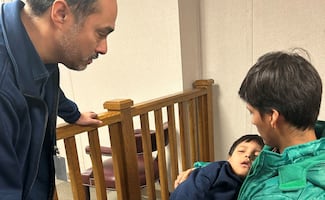Más Información

CDMX está lista en seguridad para recibir el Mundial: Pablo Vázquez; “hay estrategias para todos los riesgos”, dice en Con los de Casa

Ciencia defiende destitución de Romero Tellaeche; dice que no presentó informe de autoevaluación en los últimos tres años

Dos detenidos y presunto exceso de velocidad, lo que sabemos del descarrilamiento del Tren Interoceánico; se cumple un mes
Young girls and teenagers
living in extreme poverty skip school during their period because they can't afford to buy pads or because they are afraid of staining their clothes.
According to Lorena Vázquez Ordaz , executive director of The Hunger Project México , in areas in places such as Chiapas, Oaxaca , and the Huasteca Potosina , the issue has worsened because in those communities families don't have toilets with all the services.
“They have latrines , which are normally a hole (on the ground), girls don't go to school because they fear to stain (their clothes) and they lack the proper facilities, their hygiene is not the most adequate,” she explained.
Therefore, the organization has worked in Catishtic , a town located in San Juan Chamula, Chiapas , to teach women to build bathrooms with showers so that they can wash themselves safely.
This is quite significant since, in Chiapas , 3 out of 10 people live in extreme poverty , according to the latest Coneval report.
The program teaches girls and women different construction and installation methods . Girls themselves designed their own bathrooms , each one is designed to solve their needs.
“ Girls understood that they didn't have to depend on anyone else to solve a problem that is so vital to them, such as intimate hygiene .”
Lorena Vázquez
considers that those who create public policies and make decisions are mostly men who don't think about these issues that are so important for girls and teenagers .
Moreover, the expert explains that while visiting these impoverished communities , they learned about cases of young women who were sexually abused on their way to the bathroom because latrines are outside the homes and the teenagers had to leave the home at night, in the dark, and that's when they were attacked.
Teachers save the day
Janett Violeta Andrade
has been a mathematics teacher at the Antonio Caso junior high school, in Cuautla , Morelos for 11 years.
She says that “during my times, no one talked to us about that topic and when I had my period for the first time, I showered like five times that day.” The teacher explains that she always carries pads to give them to teenagers , although there is a machine that sells them for MXN $5 at school.
The teacher thinks that one of the main issues is that girls and teenagers don't talk about the issue with their parents .
“They ask me how to put on (a pad ) and they are ashamed to talk about the issue.”
Also, many of them don't know what menstruation is or how to manage the situation.
No tax for pads and tampons
Other countries are setting an example for Mexico by eliminating the tax on these products. For example, in Kenya , the government is allocating resources so that schools can provide free pads for girls and teenagers since they mostly use old rags, toilet paper, and paper sheets .
Moreover, in 2013, the East African Legislative Assembly asked its members to free pads and other menstrual hygiene products from taxes , in order for them to be affordable for low-income girls.
Since 2013, the Menstrual Hygiene Day was established and it's celebrated on May 28, in order to give visibility to the issues and taboos surrounding menstruation .
These initiatives are changing the lives of thousands of girls in other countries and if implemented in Mexico , they would certainly benefit Mexican girl s, who shouldn't miss school or be sexually assaulted for having their period .
gm
Noticias según tus intereses
[Publicidad]
[Publicidad]












